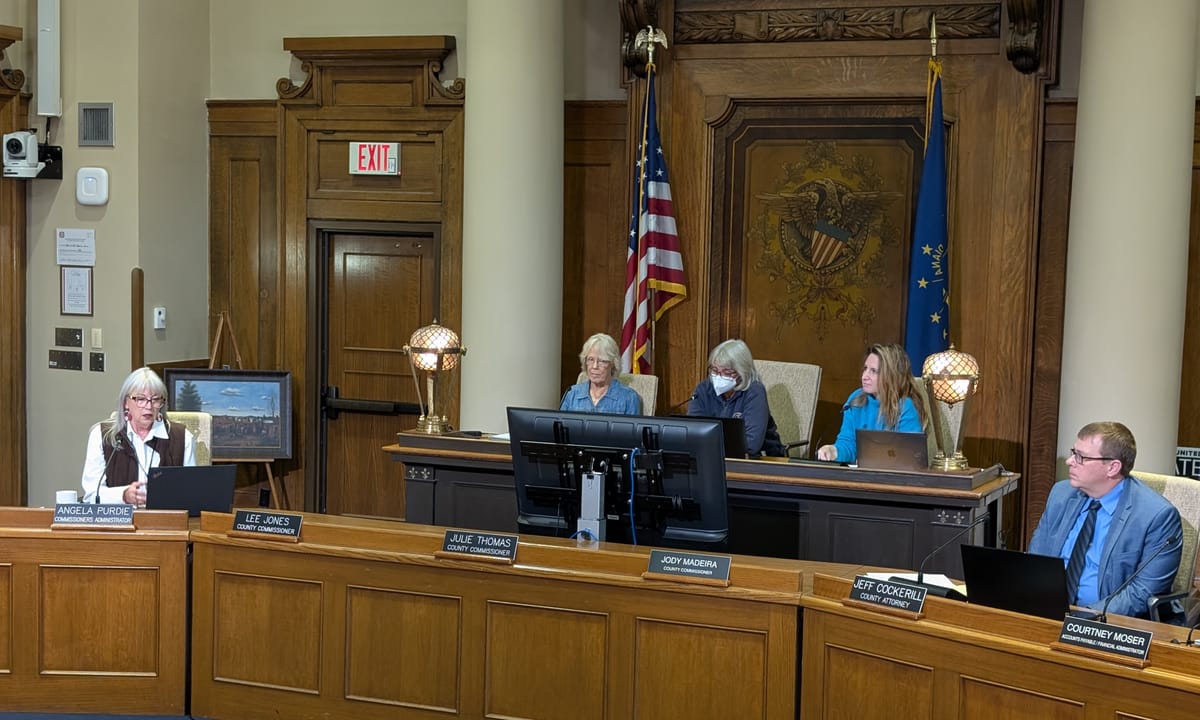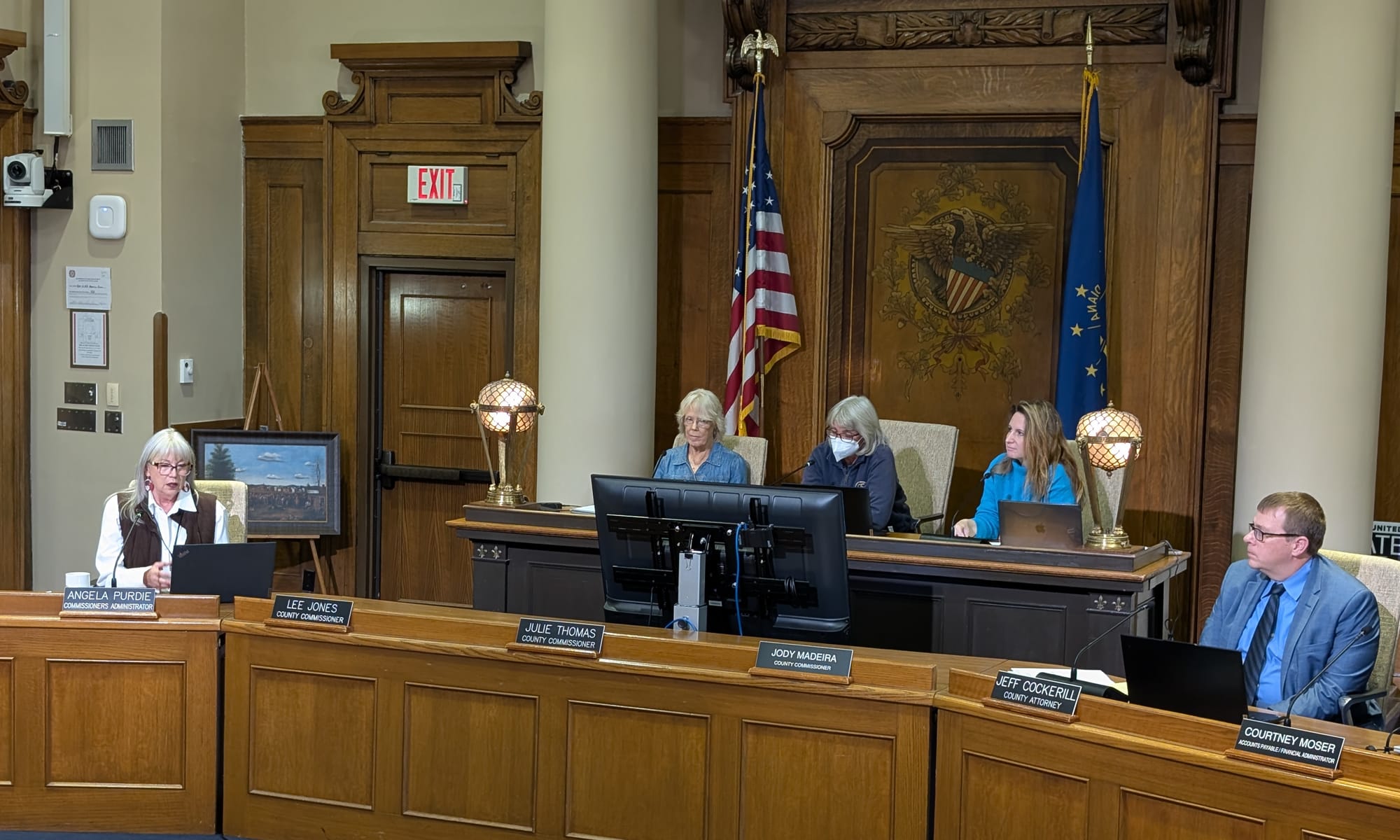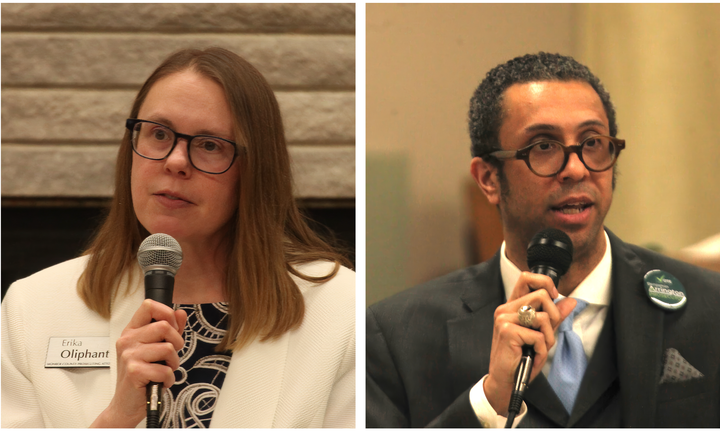Monroe County commissioners warn: Council’s ‘no’ vote may shift jail’s future to federal court
After the Monroe County council on Tuesday rejected funding to buy land for a new jail, county commissioners warned on Thursday that the decision could hand control of jail planning to a federal judge, when the ACLU settlement expires on Jan. 15 2026.


The impact of the Monroe County council’s unanimous vote on Tuesday night—to reject an appropriation needed to buy land that was planned as the site of a new jail—has started to trigger reactions from observers.
That includes the people who are among those following the issue closest, the county commissioners. It’s the statutory responsibility of commissioners to provide a jail, even if it is the sheriff who is responsible for operating it.
At the end of their regular meeting on Thursday morning, a little less than two days later, county commissioners took the chance to comment on the outcome of the county council’s vote.
For her part, president of the county board of commissioners Julie Thomas looked to the county council to deal with the consequences of their vote to reject North Park as a jail site, wrapping up her remarks by saying: “So with that, ball’s in your court, council!”
But the court in question might be the U.S. District Court. Based on additional commentary by commissioners at the meeting and followup by The B Square, commissioners think the county council’s vote means it could now become a real possibility that decisions about a new jail for Monroe County could eventually be made by a federal judge, instead of local officials.
The key date, which will bring the issue of the court’s role into sharper focus, is Jan. 15, 2026. That’s the expiration date of the current settlement agreement between the sheriff’s office and the ACLU, in a lawsuit that was filed in 2008 over crowded conditions at the jail. The agreement, which was reached in 2009, has been extended several times. The current extension goes through Jan. 15, 2026.
County attorney Jeff Cockerill told The B Square that the ACLU had for many years been granting extensions to the agreement without much pushback. But for the extension from 2019 to 2020, Cockerill said, the lead attorney for the ACLU, Ken Falk, told Monroe County officials that he thought they were starting to use the settlement agreement as a crutch, to avoid taking substantive action on the jail.
That’s what led to the commissioning of a study that was ultimately delivered to Monroe County government in 2021. The headline out of that report from the study was “The jail facility is failing …”
As recently as August of this year, Falk has said at a public meeting with Monroe County officials that:“I do not disagree that there should be alternatives [to incarceration] but that does not in any way diminish the fact that you guys need a new jail.”
With the commissioning of the 2021 study, some subsequent work of a Justice Finance Advisory Committee (JFAC), and substantive attempts to identify a location, including making purchase offers, the county government could show the ACLU evidence of progress towards construction of a new jail.
But in light of Tuesday’s vote by the county council, Thomas told The B Square that she is not sure how to make the case for “progress.” Commissioner Jody Madeira, who is a law professor at Indiana University, added that it’s also required that the county government demonstrate “candor” to the court when it comes to the settlement agreement, and be frank with the court about the county council’s vote on Tuesday.
Listening to the meeting of county commissioners remotely as it unfolded was county council president Jennifer Crossley. Reached later, she told The B Square that the idea that Monroe County would sit passively and allow the settlement agreement to expire without protest is “a bunch of malarkey.” She added that she thinks it would be “ridiculous” if county electeds simply said to ACLU attorney Ken Falk: “Let this lawsuit stick!”
Crossley said, “I would think responsible leadership—and I emphasize leadership—would say: This is not what we wanted.” She added, “But time is of the essence.” Crossley said she is looking to the next scheduled council meeting, on Nov. 10 as a place where the commissioners and councilors could have a conversation about next steps on the jail project.
Toward the end of Thursday’s meeting of the county commissioners, it was Thomas who led off commentary about the council’s Tuesday jail vote, expressing frustration and disappointment at how a five-year process had come to an end on Tuesday’s unanimous vote.
After considering other sites, including Fullerton Pike, the Hopewell neighborhood, Vernal Pike, the Thomson PUD, the commissioners had landed on North Park as the location for a 500-bed facility with a working budget of about $225 million. The appropriation denied by the county council on Tuesday night would have been enough to close the $11.375 real estate deal on North Park, which is located northwest of Bloomington off SR-46.
A point of emphasis for Thomas was the fact that the county council had approved the purchase of North Park a year ago. For most contractual issues, it’s only the commissioners who need to vote, with the county council, as the fiscal body, only having control of the purse strings. But for land purchases, the county council also has to approve the purchase agreement. That’s why Thomas said to councilors on Tuesday: “The question is: Are you ready to pay the bill?”
Thomas noted that the county council had approved the jail tax in support of constructing a new jail.
Thomas’s exasperation was evident when she said, “We spent five years on this project, and you know, all along the way, working with the council—all along the way, working with the council—but it’s been five years.”
Administrator for the commissioners, Angie Purdie said she was “depressed about how we’re going to go forward—if we can even go forward.” Purdie called the council’s vote like “having the rug pulled out from underneath you.” Commissioner Lee Jones said “I just hope that moving forward, the council can come together a bit more in agreement, and hopefully this project will still be able to happen.”
Thomas, along with Jones, was already serving as a county commissioner when the most recent effort on new jail construction started, around 2019.
Taking office just this January was Jody Madeira. On Thursday, she hit the same points she had highlighted at Tuesday’s meeting, when she addressed the county council before their pivotal vote. The basic theme of her remarks is that there is only so much that local policies—on treatment of substance abuse and mental illness—can do, to keep the jail population small. It’s state and federal laws that have an impact, with local judges constrained by the fact that they have to apply the law.
Madeira ticked through several pending proposals in the state legislature that would cause jail populations to swell. One is a proposal to establish statewide minimum bail amounts. Currently, Indiana lacks a uniform statewide schedule for bail, Madeira said, so counties set their own provisional amounts. Madeira said, “For some reason, state officials are worried that folks lack incentives to show up for their trials, or that judges are setting bail too low.” That’s why some legislators are looking at imposing a statewide minimum bail.
Madeira said, “That effectively puts people in jail if they cannot afford to post bail.” About the effect of a minimum bail, Madeira predicted: “This will disproportionately detain low income individuals, exacerbate health problems and have little impact on crime rates, but it will also swell our county jail populations extraordinarily high.”
Madeira also made another “grim and dismal” prediction. She started by noting that Howard County and Allen County, which were also under ACLU settlement agreements about jail issues, were dragging their feet on addressing the problems. “The ACLU called in the federal courts,” Madeira said, and brought those two counties “to heel.” Those counties lost a great deal of autonomy, and they also ended up building jails, Madeira said.
When Monroe County’s settlement agreement ends in mid-January, Madeira predicted: “We will end up losing our autonomy, our privilege of choice, and we, in turn, will have to build a jail—which might end up being bigger, badder, and in a location we don’t want, because we lost our choice and our chance.”




Comments ()